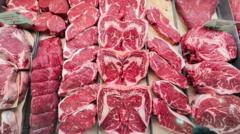Should Meat Packers Be Investigated for Rising Beef Prices?

Published: 2025-11-09 08:00:14 | Category: technology
The recent call by former US President Donald Trump for a Justice Department investigation into meat-packing companies highlights his concerns over rising beef prices, which he attributes to potential antitrust violations within the industry. This move reflects broader anxieties about food inflation and its political implications, particularly following recent electoral setbacks for the Republican Party. Trump's focus on beef prices indicates a shift towards addressing the role of meat processors, which dominate the market and have been accused of manipulating prices, thereby impacting American consumers.
Last updated: 06 October 2023 (BST)
What’s happening now
In the wake of soaring beef prices, Trump has explicitly requested investigations into the meat-packing sector, suggesting that illicit practices such as collusion and price fixing may be at play. This development comes as prices for beef have hit record highs, with retail prices for beef mince rising 12.9% and beef steaks up 16.6% over the past year. Trump's statements on social media have underscored his commitment to supporting American ranchers, while also pointing to foreign-owned meat-packing companies as culprits in the price inflation crisis.
Key takeaways
- Trump has called for a federal investigation into meat-packing firms over rising beef prices.
- Retail beef prices have surged significantly, outpacing general food inflation.
- Concerns about market consolidation have led to bipartisan scrutiny of the meat processing industry.
Timeline: how we got here
The dynamics surrounding beef pricing and industry practices have evolved significantly over the years:
- 1948: The US cattle inventory reaches historic levels.
- 2000-2023: Gradual contraction in the cattle industry due to various factors, including drought.
- September 2023: Retail beef prices rise sharply, with beef mince up 12.9% and steaks up 16.6% year on year.
- October 2023: Trump calls for an investigation into meat-packing companies.
What’s new vs what’s known
New today/this week
Trump's latest demand for a probe into meat-packing companies marks a significant shift in his approach to combating rising food prices. It signals a strategic pivot away from ranchers and towards the processing sector, which he claims is responsible for inflating prices.
What was already established
Historically, the meat-processing industry has faced criticism for its consolidation, with just four firms—Tyson, JBS, Cargill, and National Beef—controlling over 80% of the market. This concentration raises concerns about competition and pricing integrity in the beef supply chain.
Impact for the UK
Consumers and households
While this investigation is focused on the US market, it has implications for UK consumers as well. Rising beef prices may influence the cost of imported beef products in the UK, possibly leading to higher retail prices and affecting consumer choices. Moreover, fluctuations in the global beef market due to US policy changes could indirectly impact UK supply chains.
Businesses and jobs
For UK businesses involved in the meat supply chain, including importers and retailers, changes in US beef pricing could affect procurement strategies and profit margins. Should the US adopt measures that successfully curb price inflation, it could lead to a more competitive environment that benefits UK consumers and businesses alike.
Policy and regulation
The UK government may take cues from the US situation as it relates to food pricing and market competition. The ongoing scrutiny of corporate practices in food supply chains could prompt similar investigations or regulatory measures in the UK, especially if consumer prices continue to rise.
Numbers that matter
- 12.9%: Increase in retail prices for beef mince in the year to September.
- 16.6%: Rise in beef steak prices over the same period.
- 80%: Percentage of the US beef market controlled by four major companies.
- $6.33 (£4.75): Average cost of a pound of ground chuck in October 2023, compared to $5.58 a year ago.
- 3.1%: General food inflation rate in the US, highlighting the severity of beef price increases.
Definitions and jargon buster
- Antitrust: Laws designed to promote competition and prevent monopolistic practices.
- Meat-packing: The industry involved in slaughtering livestock and processing meat for sale.
- Consolidation: The process of fewer companies controlling a larger share of the market, often leading to reduced competition.
How to think about the next steps
Near term (0–4 weeks)
In the short term, observers should watch for developments regarding the Justice Department's response to Trump's request for an investigation. Any immediate findings or actions could impact public perception and pricing strategies in the meat market.
Medium term (1–6 months)
Over the coming months, the outcomes of the investigation into meat-packing companies may lead to legislative changes or regulatory reforms aimed at increasing market competition. This could reshape pricing structures and influence the broader food supply chain.
Signals to watch
- Updates from the Justice Department regarding the investigation into meat-packing firms.
- Changes in retail beef prices and consumer spending patterns.
- Responses from ranchers and meat processors to proposed regulations.
Practical guidance
Do
- Stay informed about beef pricing trends and market conditions.
- Consider diversifying sources for meat products to mitigate price increases.
- Follow developments regarding US policies that may affect the UK market.
Don’t
- Ignore the potential impact of US meat pricing on UK supply chains and consumer choices.
- Make assumptions about pricing without considering broader market factors and trends.
- Overlook the role of consolidation in affecting competition within the meat industry.
Checklist
- Check current beef prices in your local market.
- Research alternative meat sources or products.
- Stay updated on US regulatory changes affecting food supply chains.
- Monitor consumer sentiment towards beef purchasing amid rising prices.
- Engage with local suppliers to understand their pricing strategies.
Risks, caveats, and uncertainties
There are uncertainties surrounding the potential outcomes of the investigations and how they may impact pricing in the meat market. Factors such as existing supply constraints, the ongoing consolidation of the industry, and external economic pressures could significantly affect the results. Additionally, Trump's focus on the meat-packing industry may shift if other political or economic issues arise, influencing consumer perceptions and behaviours.
Bottom line
The ongoing investigation into meat-packing companies led by Trump highlights critical concerns over beef pricing and market practices. As the situation develops, UK consumers and businesses should remain vigilant, as any changes in US policy could ripple through to the UK market, affecting pricing and availability of beef products.
FAQs
What is the current state of beef prices in the US?
In the US, beef prices have surged significantly, with retail prices for beef mince and steaks rising by 12.9% and 16.6% respectively over the past year.
How might the investigation into meat-packing companies affect consumers?
The investigation could potentially lead to changes in pricing structures within the meat market, which may benefit consumers if competition increases and prices stabilize.
What role does consolidation play in the beef industry?
Consolidation in the beef industry has led to a few large firms controlling over 80% of the market, which raises concerns about competition and price manipulation.



